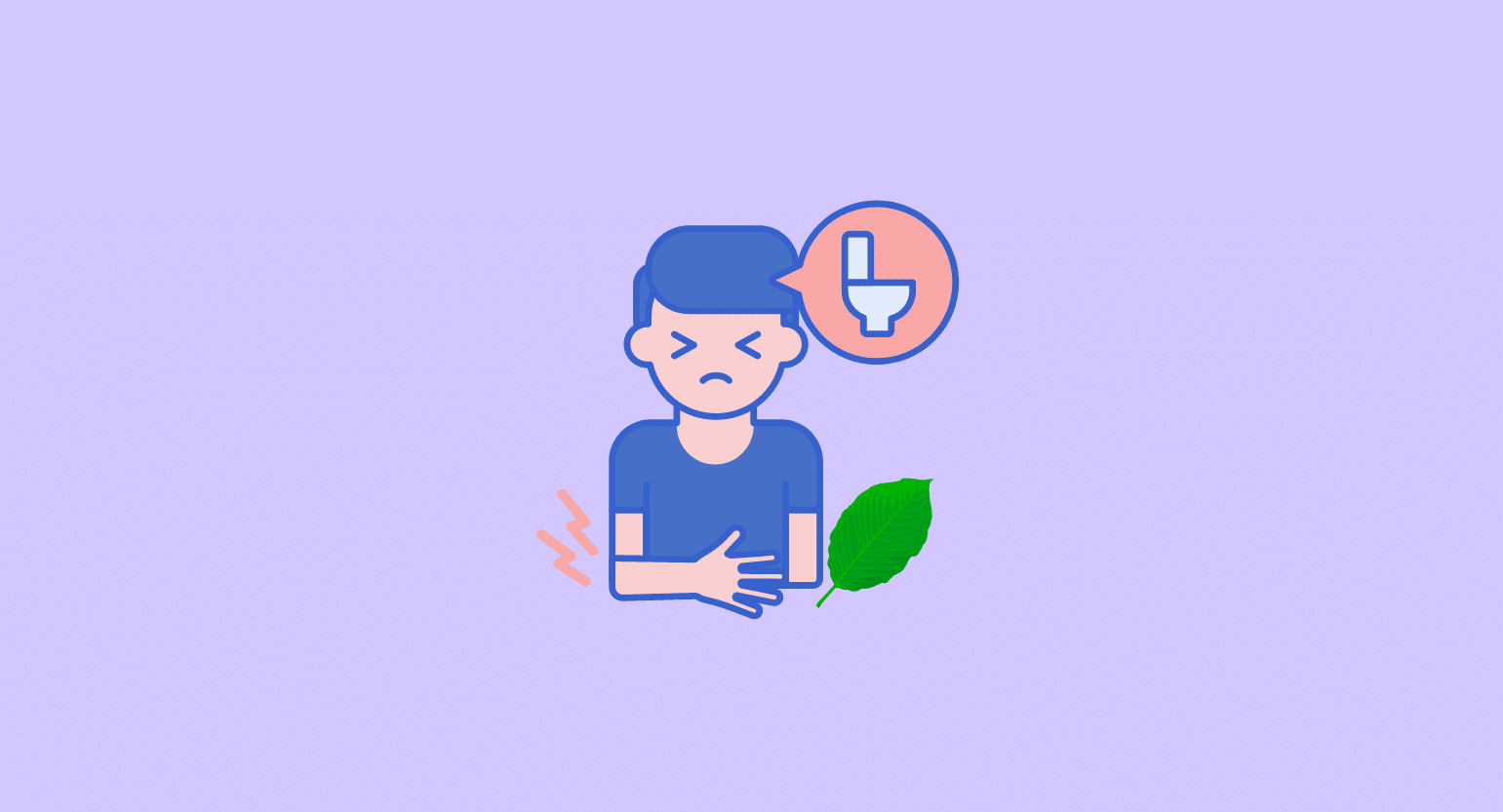Kratom Alkaloids & Their Effects on Digestion
Kratom is a complicated plant. It contains more than 15 pharmacologically-active alkaloids and countless other supportive compounds — each one delivering a separate set of effects.
Some of the alkaloids in kratom stimulate the digestive tract — potentially leading to diarrhea; others inhibit digestion, leading to issues with constipation or bloating.
So the answer to “does kratom cause diarrhea” depends on which strain you’re using, how much you take, and the current state of your digestive tract.
Kratom was actually used as a treatment for diarrhea in traditional cultures in Southeast Asia — so most people are more likely to experience constipation than diarrhea.
Kratom Alkaloids & Constipation
Opioids, including the alkaloids found in kratom, slow down digestive motility. In other words, they keep stuff from moving quickly through your digestive tract.
This can result in your stool remaining inside your gut for a longer period, becoming more solid. Kratom is also very dehydrating and can suck water out of the gut. A dry stool does not move quickly at all.
If you drink enough water during your kratom usage, you might be able to offset some of the constipating side effects. Some people can use kratom for extended periods without having to experience constipation at all.
However, most users will find that a regular kratom backs them up a bit. Gentle laxatives, a diet rich in fiber, plenty of water, and a regular bowel movement schedule can help to prevent this.
However, not everyone experiences constipation when using kratom. Some users, especially those highly sensitive to certain neurotransmitters, may experience the opposite.

Kratom, Serotonin & Digestion
Two alkaloids are particularly effective at targeting the serotonin system, paynantheine and speciogynine [1]. Rather than targeting the opioid system like the chief alkaloid, mitragynine, these two targeted specific serotonin receptors (5-HT1A and 5-HT2B).
Researchers are unsure whether or not the alkaloids themselves directly stimulate the opioid system or whether their metabolites (9-0-desmethylspeciogynine and 9-0-desmethylpaynantheine) do. But that’s neither here nor there.
The serotonin system is intimately involved with digestion. The majority of our serotonin is produced in the gut, where most serotonin receptors are. Those responsible for modulating mood and wellbeing encompass only about 10%.
Drugs that stimulate serotonin are known to cause digestive upset. This can contribute to diarrhea, especially in times of high stress [2]. However, kratom’s effect on serotonin is pretty marginal compared to more potent serotonergic drugs like MDMA.
Adrenaline, Fight or Flight & Diarrhea
Adrenaline is also involved in digestive health. Again, its effects on the digestive tract are significantly stronger when an individual is stressed or anxious. These states of mind cause the body to release adrenaline, among other chemicals, that can trigger diarrhea.
Since kratom causes a similar release of stimulating hormones, it may cause the same reaction. Kratom is known to provoke anxiety in specific individuals. Stimulating strains are more likely to do so. As such, they would be more likely to contribute to diarrhea.
The fight or flight response is involved in this particular type of diarrhea. Why, exactly, it is a benefit for people to void their bowels during a moment of acute stress spontaneously is up for debate.

Kratom Withdrawal & Diarrhea
While most kratom users won’t become addicted, it’s entirely possible to develop an addiction to kratom. It’s important to be conscious about how often you’re using it.
Kratom dependence means that your body needs kratom to function correctly. If you stop using kratom once you’re dependent on it, you’ll experience many unpleasant symptoms — diarrhea is the most common.
Kratom withdrawal symptoms are the exact opposite of what you experience when using it. The warm, soothing reassurance of kratom is replaced by cold sweats, fatigue, malaise, and emotional instability.
Because kratom typically causes slower movement in the digestive tract, withdrawal symptoms tend to involve faster movement instead (aka diarrhea).
Cramps, bloating, nausea, vomiting, and diarrhea abound for those in the throes of kratom withdrawal. This diarrhea can last anywhere from a few days to a couple of weeks, depending on the intensity of your kratom addiction.

Managing Acute Kratom-Induced Diarrhea
For those rare folks who experience diarrhea immediately upon consuming kratom, there’s not much that you can do to help prevent this side effect. If you’re planning to continue using kratom, then this is likely something you’ll have to contend with.
It’s possible that using a different strain could eliminate this issue, but this isn’t always the case.
There are a few things that you may wish to look into. For example, it may be worth assessing what sensitivities are causing you to react in this way. Are you prone to panic and anxiety? Do you struggle with digestive issues in general?
While kratom-induced diarrhea does not necessarily indicate health problems, it could provide clues for a way to better balance your body chemistry. Don’t stress too much about it (lest you develop diarrhea!) but also, don’t miss out on an opportunity to know your body better!
Managing Diarrhea Caused By Kratom Withdrawal
For the rest of us lucky souls, kratom won’t cause us diarrhea until we’re done with it. Then, however, it will strike with a vengeance. Diarrhea is one of the most irritating and in-your-face symptoms of severe kratom withdrawal.
Fortunately, it’s relatively easy to manage.

Anti-Diarrhea Medication
Most people quell their diarrhea by using over-the-counter anti-diarrhea medication like Imodium. Medication like this is generally not advised for diarrhea caused by illness, but short-term use isn’t an issue for withdrawal.
Fortunately, kratom withdrawal symptoms will go away after a few days. Keep yourself hydrated, ensure you’re getting plenty of electrolytes, and get plenty of rest.
Fiber Supplements
Taking a fiber supplement like Metamucil (psyllium husk) can significantly help constipation and diarrhea. Psyllium is considered a ‘bulk-forming laxative.’
This might sound like the last thing you want, but it can help a lot.
As a bulk-forming agent, psyllium helps to add mass to your stools. It helps most when used for several days, so if you’re planning to quit using kratom, you might want to start taking it a few days before. It will help everything reach a consistent size and appropriate density to pass easily. In this way, it can also help you when you’re constipated.

Stay Hydrated
Diarrhea can be extremely dehydrating. Millions die every year from diseases that cause diarrhea as a primary symptom. This is because diarrhea can drain the body of fluid incredibly quickly.
Kratom diarrhea won’t kill you. But it can dehydrate you and lead to all sorts of other unpleasant symptoms that can make your withdrawal much more uncomfortable.
Of course, very severe dehydration can kill you. So if you’ve been experiencing extreme diarrhea for more than 24 hours, it’s important to visit a hospital for a checkup immediately.
Kratom & the Opioid System
There’s a lot of debate and controversy surrounding kratom and its opioid-like status.
Many kratom users feel that branding it as an opioid will do irreparable damage to its reputation and increase the risk of it being banned from the market. In extreme cases, this leads to people falling into denial and refusing to acknowledge the science of kratom.
On the other extreme, some demonize kratom because it contains alkaloids that target the opioid system. They bark and shout, claiming that kratom is equally as dangerous as morphine (evidence strongly suggests it’s not) and that it’s getting swaths of teenagers addicted and ruining their lives.
Both of these extremes are just that: extreme. The reality lies somewhere in the middle. Kratom itself is not an opioid. It’s also not an opiate. By definition, opiates must come from the opium poppy itself.
However, kratom does contain some alkaloids that could be considered opioids. By definition, opioids are natural or synthetic compounds that interact with the body’s opiate system to produce morphine-like effects. Kratom certainly has a few of these.

Why Does This Matter?
Opioids are a class of drugs that bind with a specific system in our body. This allows us to predict relatively easily what effects different opioids will produce.
Any opioid compound will have a strong affinity for the digestive system. They can produce many different symptoms due to this, ranging from constipation to bloating and discomfort.
Generally, the intensity of these symptoms varies a lot and depends on your dose. Kratom is relatively mild compared to synthetic opioids, at least when used responsibly. However, the alkaloids present in kratom have numerous effects different from typical opioids.
Is Kratom Safe?
Kratom is safe compared to other opioids. In fact, it’s significantly safer.
The primary alkaloid found in kratom (mitragynine) is, by weight, about a hundred times weaker than morphine. On top of that, there are only minute quantities of it in kratom. Theoretically, extracts made with pure mitragynine could be dangerous. But that’s not kratom, then, is it?
Kratom contains a whole family of different alkaloids. They are a combination of both agonists (substances that activate receptors in the opiate system) and antagonists (substances that occupy the receptor but don’t activate it).
This allows kratom to have a unique type of safety feature not found with synthetic opioids. Because the antagonists and agonists may be at odds, kratom has a rate-limiting effect.

Final Thoughts on Kratom & Diarrhea
Can kratom cause diarrhea? Sure, it certainly can.
However, this is generally the exception for light kratom users rather than the rule. Highly sensitive individuals can experience diarrhea due to increased adrenaline and serotonin, but most people only experience it when they go through withdrawal.
For those in withdrawal, however, diarrhea is often a significant issue. It can be managed with over-the-counter medication, fiber supplements, and proper hydration.
León, F., Obeng, S., Mottinelli, M., Chen, Y., King, T. I., Berthold, E. C., … & McCurdy, C. R. (2021). Activity of Mitragyna Speciosa (“Kratom”) Alkaloids at Serotonin Receptors. Journal of Medicinal Chemistry, 64(18), 13510-13523.
- Dong, Y., Han, Y., Wang, Z., Qin, Z., Yang, C., Cao, J., & Chen, Y. (2017). Role of serotonin on the intestinal mucosal immune response to stress-induced diarrhea in weaning mice. BMC gastroenterology, 17(1), 1-10.









